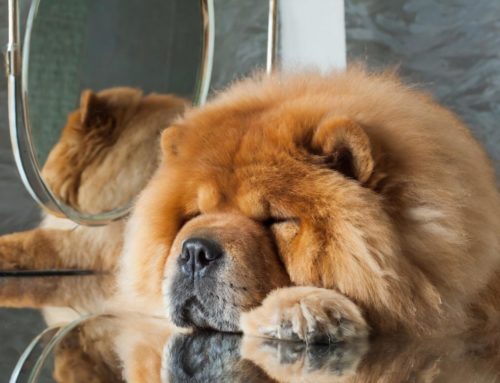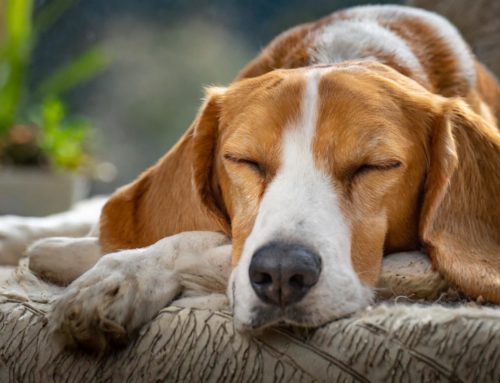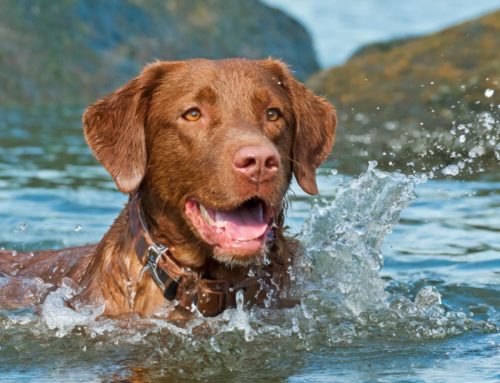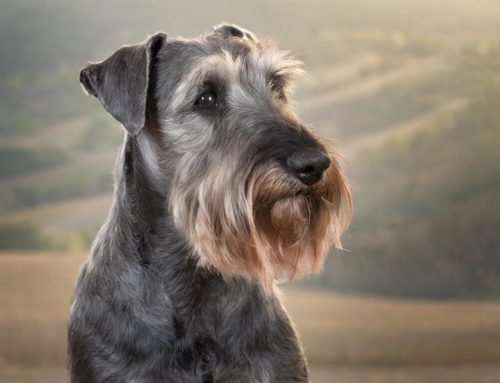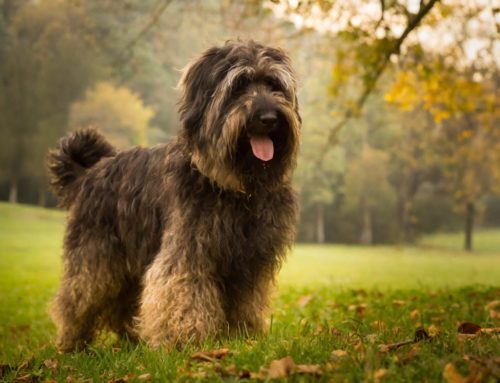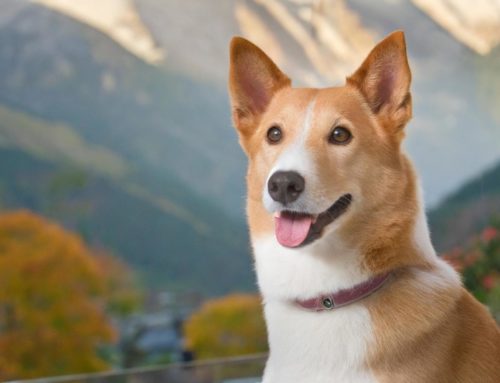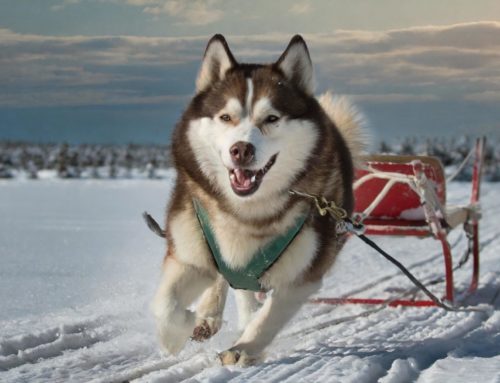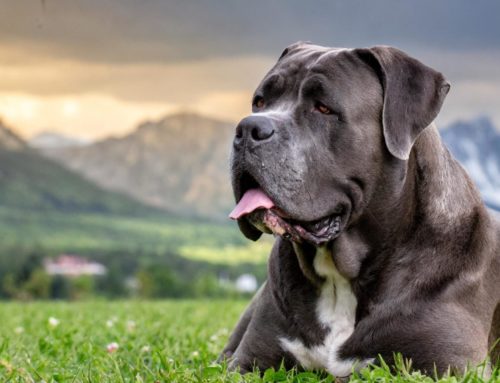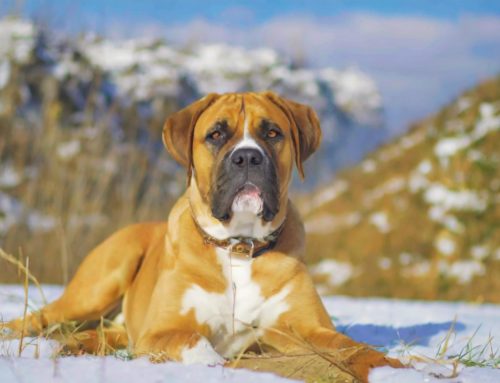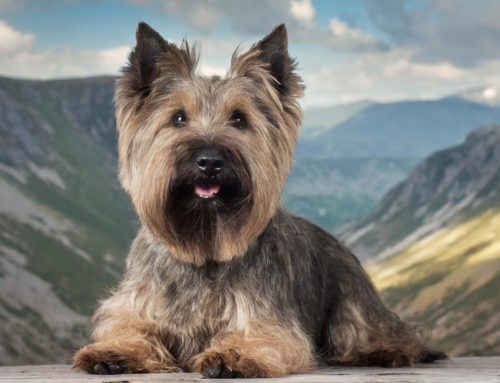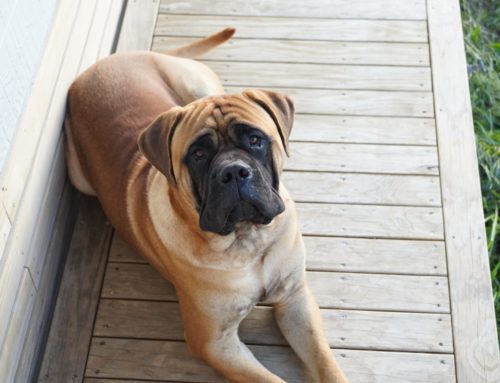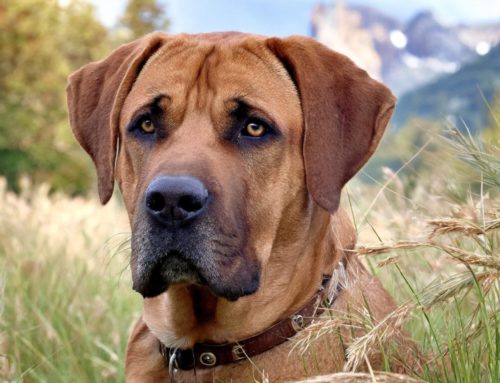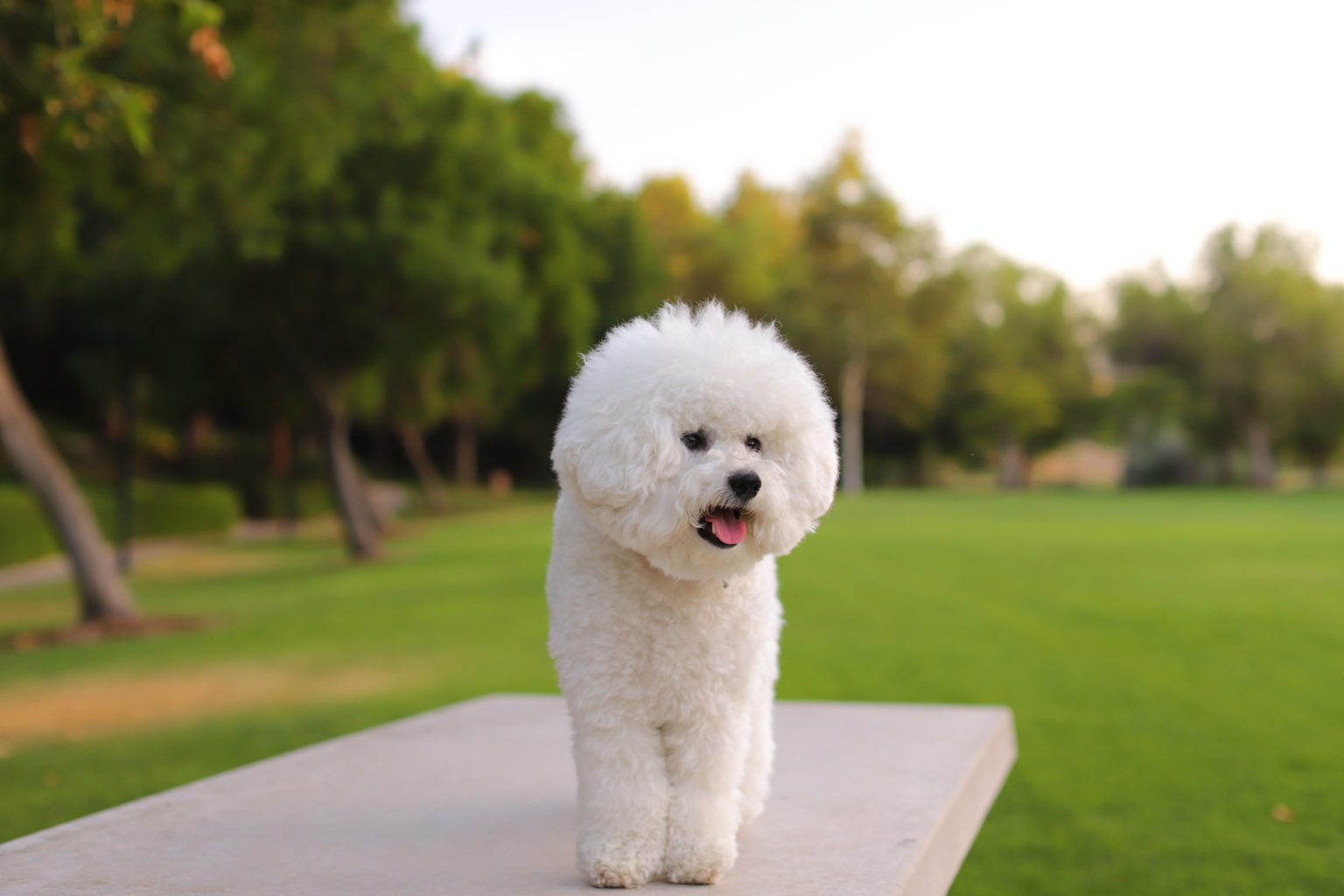
Known for its distinctive spiral, fluffy coat, the Bichon Frisé is a small and affectionate dog breed. With a shoulder height of about 30 cm and a weight of about 5 to 6 kg, they are among the smaller dog breeds. Originally created from crosses between Barbet-Spaniel types and small white poodles, the Bichon Frisé is a distinct companion dog.
The history of the Bichon Frisé dates back to the 14th century. They originated from the Canary Islands, particularly Tenerife, and were brought to mainland Europe by sailors. Their popularity rose considerably when they became a favourite of Mediterranean royal families, especially as ‘lap dogs’.
The name ‘Bichon Frisé’ comes from French, with ‘Bichon’ meaning small dog and ‘Frise’ describing curly. Their snow-white, silky coat needs regular brushing and trimming to stay tangle-free. The Bichon Frisé’s dark eyes are lively and expressive, adding to their charming appearance.
FCI Group 9 – Companion and Toy Dogs
The Bichon Frisé, belongs to Group 9 of the Fédération Cynologique Internationale (FCI), specifically in the Small Companion Dogs section. This group includes breeds bred primarily for companionship.
The Bichon Frisé is notable for its fluffy, white coat and lively, expressive eyes. Its distinctive coat requires regular maintenance, including brushing and trimming, to maintain its neat, curly appearance.
This breed is known for its cheerful and friendly nature. Bichons are very sociable and get along well with children and other pets, making them excellent family dogs.
The appearance and coat of the Bichon frisé
Often compared to breeds such as the Maltese, Havanese and Bolognese, the Bichon Frisé is a charming little companion dog known for its affectionate and gentle nature.
With a shoulder height of about 25 to 30 cm and a weight of about 5 kg, Bichon Frisés are ideal for people with limited living space or those with allergies, as their fur is low on shedding. The Bichon Frisé is particularly recognisable by its distinctive, snow-white, curly coat, which is soft and spiral-shaped.
This coat requires regular grooming to prevent tangles and keep it in optimal condition. Their dark eyes are lively and contribute to their expressive facial expression.
Hereditary diseases and disorders
A generally healthy dog breed, the Bichon Frisé can nevertheless be susceptible to some hereditary diseases and disorders.
Some common hereditary diseases and disorders in the Bichon Frisé are:
- Patella luxation: This is a common problem where the kneecap shifts out of its normal position, which can cause discomfort and mobility problems.
- Allergies: Bichon Frisés can be prone to skin allergies, which can be caused by various factors, including food and environmental allergens.
- Bladder stones: They have a predisposition to developing bladder stones, which can cause urinary tract problems.
- Eye problems: Such as cataracts and tear duct problems, which can lead to excessive tearing and other eye problems.
- Hip dysplasia: Although less common than in larger breeds, hip dysplasia can also occur in Bichon Frisés.
- Dental problems: Because of their small mouth, they can be prone to dental problems such as tartar buildup and gum disease.
The character of the Bichon frisé
A small and charming dog breed, the Bichon Frisé is known for its cheerful and affectionate nature.
These little “lap dogs” are very affectionate and enjoy being taken everywhere. Their coat requires regular grooming to prevent tangles and maintain their snow-white sheen. Bichon Frisés are active dogs and need plenty of exercise.
As companion dogs, they are extremely sociable and get along well with other pets and people. They are intelligent and learn quickly, which facilitates socialisation and training. Their friendly and open attitude makes them popular, especially in the United States.
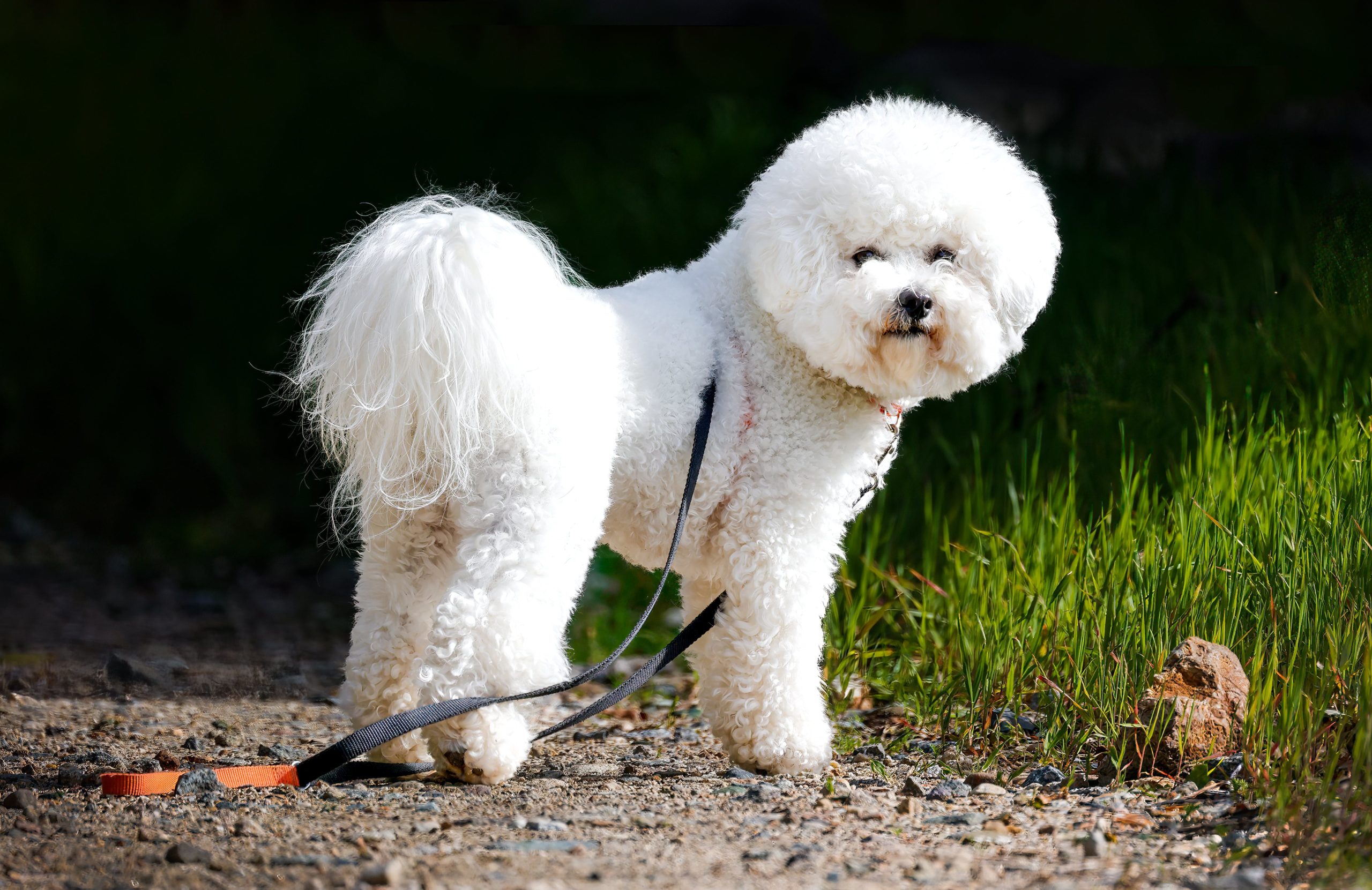
The Care of the Bichon Frise
Here are some essential grooming tips for the Bichon Frisé:
- Coat care: The coat of a Bichon Frisé is one of its most striking features. It should be brushed and trimmed regularly to avoid tangles. Their coat is similar to that of a Mongolian goat, soft and fluffy. Attention around the eyes is important to avoid spots.
- Nutrition: proper nutrition is crucial to the health and life expectancy of the Bichon Frisé. Choose high-quality dog food tailored to their age, size and activity level.
- Health and welfare: Regular visits to the vet are necessary to ensure the Bichon Frisé stays healthy. This breed gets along well with other pets and people but, like any dog, needs regular social interaction and exercise.
- Social interaction: Bichon Frisés are open and intelligent dogs that enjoy company. They are very affectionate and are known for their cheerful and friendly nature.
Socialisation and upbringing of the Bichon frisé
- Socialisation and upbringing of a Bichon Frisé, a small but lively dog, require a respectful and consistent approach. Although they may resemble a Spaniel or Barbet in appearance, the Bichon Frisé has a unique character reminiscent of a terrier: energetic, playful and sometimes stubborn.
- Socialisation: From puppy age, it is essential to regularly socialise the Bichon Frisé with people and other pets. This breed is known to get along well with other dogs and pets. Regular visits to an animal shelter or dog school can help develop social skills.
- Training: The Bichon Frisé is intelligent and learns quickly. Start training early to teach basic commands and good behaviour. This breed responds well to positive reinforcement.
- Physical Characteristics: With their striking white coat and distinctive drooping ears, the Bichon Frisé often carries its head proudly and high. They usually weigh around 5 to 10 kg, depending on their size. The black nose and lively expression make them an attractive appearance.
- Handling the breed: When buying or adopting a Bichon Frisé, it is important to remember that they need regular grooming and attention. They love to be the centre of attention and enjoy interacting with their people.
How much experience does a Bichon frisé require
The Bichon Frisé, often affectionately called ‘lion dog’ because of its unique coat and proud attitude, is suitable for both experienced and inexperienced dog owners.
These small, mature dogs are known for their friendly nature and ability to get along well with other pets. This makes them an excellent choice for a new home, where they often become the centre of attention. For inexperienced dog owners, the Bichon Frisé offers a good opportunity to learn about dog training and care.
They have an open nature and respond well to positive, respectful interaction. Regular grooming of their coat and basic training are essential, but not overwhelming for beginners. Experts will appreciate that, despite its small size, the Bichon Frisé is a striking dog that often carries its head and back high.
These dogs are intelligent and can benefit from more advanced training techniques and activities.
Is training necessary?
Training is absolutely essential for Bichons, regardless of whether they are puppies or adults. These charming, small dogs are known for their open and friendly nature, and they generally get along well with other pets and people. However, without proper training and socialisation, they can develop undesirable behaviour.
A Bichon Frisé often wears its head and back with pride, reflecting their confident nature. To channel this self-assurance positively, regular training is essential.It should be approached in a respectful manner, with positive reinforcement and patience being key.
Training not only helps form good behaviour, but also strengthens the bond between the dog and its owner.
Breeders can often provide useful advice on the best training methods for this particular breed. It is important for owners to understand that although Bichon Frisés are small, they need just as much attention and training as larger dogs.
How much exercise does a Bichon frisé need?
The Bichon Frisé, although a small dog breed, needs a moderate amount of exercise daily to stay healthy and happy. As an active and playful dog, the Bichon Frisé benefits from both physical and mental stimulation.
On average, a Bichon Frisé needs about 30 minutes to an hour of exercise per day. This can be divided into several short walks and indoor or outdoor play sessions.
It is important to remember that although they are energetic, long or intense activities are not appropriate because of their small size. Short walks, combined with play time and light training exercises, are ideal for this breed.
In addition to physical activity, it is crucial to mentally stimulate the Bichon Frisé. This can be done through interactive games, such as hide-and-seek toys or food puzzles, which help keep their minds sharp.
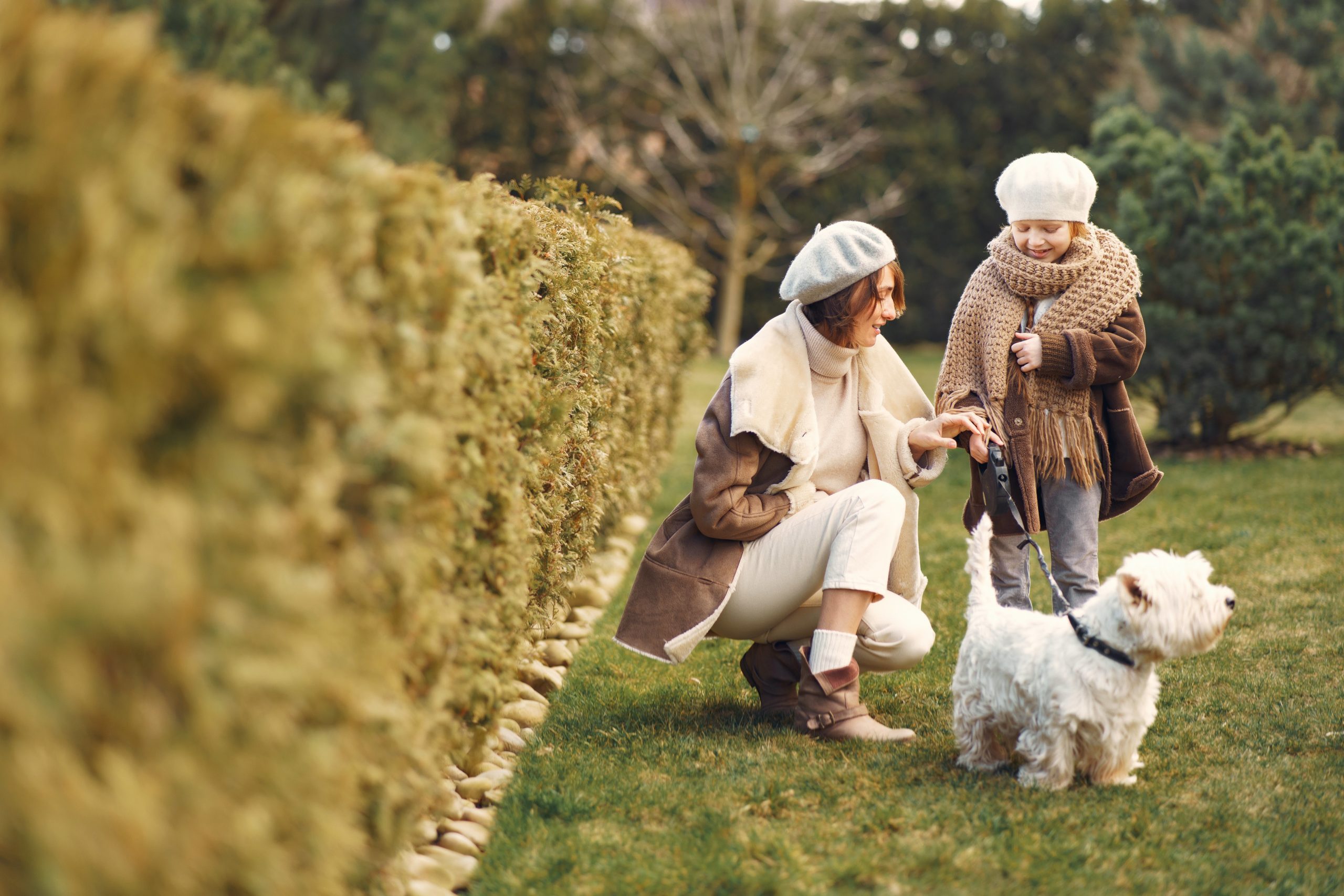
Companion dogs in family life.
The Bichon Frisé is an ideal pet for families with children, thanks to their friendly and affectionate nature. These small dogs are known for their patience and gentleness, making them good companions for children of all ages.
Their playful and cheerful nature makes them excellent playmates for children, who often enjoy the Bichon Frisé’s lively interactions and tireless playfulness. Despite their small size, Bichon Frisés are sturdy enough to withstand the playful behaviour of children.
However, they also need respect and gentle handling, especially when playing. It is important to teach children how to handle the dog in a gentle and respectful manner to avoid accidents and fear in the dog.
Bichon Frisés enjoy interaction and attention, so they often seek out company and games with children. They integrate well into a family life and offer lots of love and joy.
Benefits of a Bichon frisé
- Friendly and Affectionate: Bichon Frisés are known for their loving and friendly nature. They make excellent companions and build strong bonds with their family members.
- Good with Children and Other Pets: These dogs generally get along well with children and also get along well with other pets, if properly socialised.
- Hypoallergenic: Their fur loses little hair, making them a good option for people with allergies.
- Size: Their small size makes them suitable for living in a flat or a house with a small garden.
Disadvantages of a Bichon frisé
- Requires Regular Maintenance: Their coat requires regular brushing and trimming to prevent tangles and dirt.
- Can Develop Separation Anxiety: Bichon Frisés can suffer from separation anxiety if left alone for too long.
- Susceptible to Health Problems: They can be prone to certain hereditary health problems such as patellaluxation and eye problems.
- Training: They can sometimes be stubborn, which requires consistent training.
Life expectancy of Bichon frisé
The life expectancy of a Bichon Frisé is relatively high compared to some other dog breeds. On average, Bichon Frisés live to be between 12 and 15 years old. However, this depends on several factors, including genetics, health care, nutrition and environment.
As with all dog breeds, proper care can have a significant impact on their lifespan. Regular veterinary checks, a balanced diet, adequate exercise and good oral hygiene contribute to the overall health and well-being of the Bichon Frisé
